沪教牛津五年级英语上册牛津英语五年级上册知识点整理
- 格式:doc
- 大小:52.50 KB
- 文档页数:14
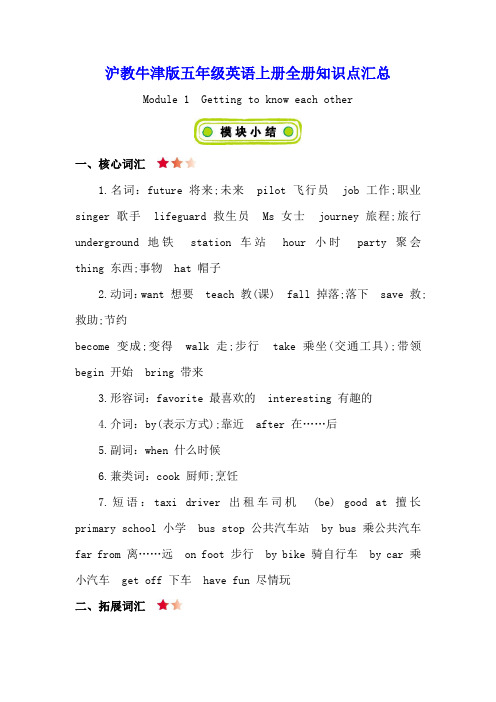
沪教牛津版五年级英语上册全册知识点汇总Module 1 Getting to know each other一、核心词汇1.名词:future 将来;未来pilot 飞行员job 工作;职业singer 歌手lifeguard 救生员Ms 女士journey 旅程;旅行underground 地铁station 车站hour 小时party 聚会thing 东西;事物hat 帽子2.动词:want 想要teach 教(课) fall 掉落;落下save 救;救助;节约become 变成;变得walk 走;步行take 乘坐(交通工具);带领begin 开始bring 带来3.形容词:favorite 最喜欢的interesting 有趣的4.介词:by(表示方式);靠近after 在……后5.副词:when 什么时候6.兼类词:cook 厨师;烹饪7.短语:taxi driver 出租车司机(be) good at 擅长primary school 小学bus stop 公共汽车站by bus 乘公共汽车far from 离……远on foot 步行by bike 骑自行车by car 乘小汽车get off 下车have fun 尽情玩二、拓展词汇1.名词:doctor 医生teacher 老师sky 天空subject 科目2.月份名词:January (Jan.) 一月February(Feb.) 二月March(Mar.) 三月April(Apr.) 四月May 五月June(Jun.) 六月July(Jul.) 七月August(Aug.) 八月September(Sept.) 九月October(Oct.) 十月November(Nov.) 十一月December(Dec.) 十二月3.动词:help 帮助4.短语:fly a plane 驾驶飞机be afraid of 害怕三、核心句型1.—What do you want to be? 你想要成为什么?—I want to be a pilot. 我想要成为一名飞行员。
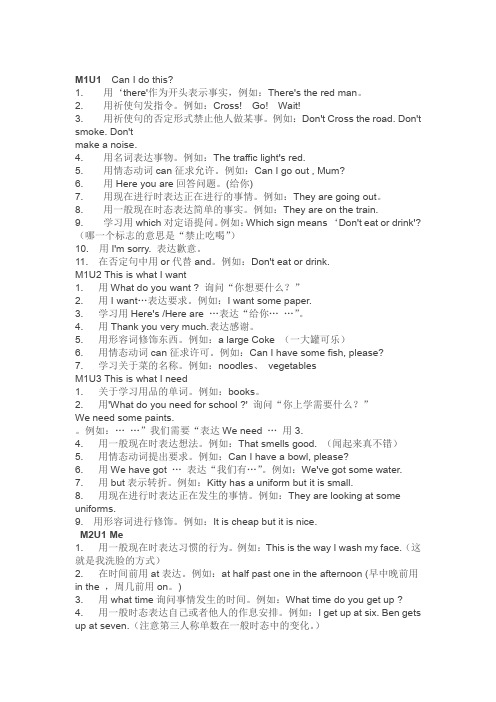
M1U1 Can I do this?1. 用‘there'作为开头表示事实,例如:There's the red man。
2. 用祈使句发指令。
例如:Cross! Go! Wait!3. 用祈使句的否定形式禁止他人做某事。
例如:Don't Cross the road. Don't smoke. Don'tmake a noise.4. 用名词表达事物。
例如:The traffic light's red.5. 用情态动词can征求允许。
例如:Can I go out , Mum?6. 用Here you are回答问题。
(给你)7. 用现在进行时表达正在进行的事情。
例如:They are going out。
8. 用一般现在时态表达简单的事实。
例如:They are on the train.9. 学习用which对定语提问。
例如:Which sign means ‘Don't eat or drink'? (哪一个标志的意思是“禁止吃喝”)10. 用I'm sorry. 表达歉意。
11. 在否定句中用or代替and。
例如:Don't eat or drink.M1U2 This is what I want1. 用What do you want ? 询问“你想要什么?”2. 用I want…表达要求。
例如:I want some paper.3. 学习用Here's /Here are …表达“给你……”。
4. 用Thank you very much.表达感谢。
5. 用形容词修饰东西。
例如:a large Coke (一大罐可乐)6. 用情态动词can征求许可。
例如:Can I have some fish, please?7. 学习关于菜的名称。
例如:noodles、vegetablesM1U3 This is what I need1. 关于学习用品的单词。
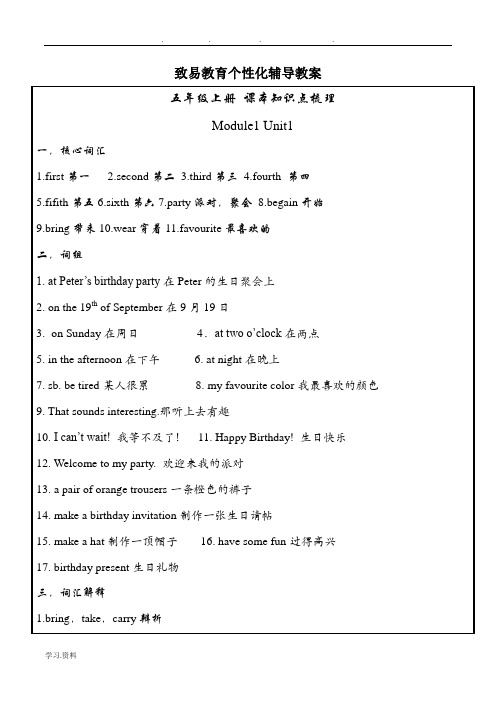
致易教育个性化辅导教案五年级上册课本知识点梳理Module1 Unit1一,核心词汇1.first第一2.second第二3.third第三4.fourth 第四5.fifith第五6.sixth第六7.party派对,聚会8.begain开始9.bring带来10.wear穿着11.favourite最喜欢的二,词组1. at Peter’s birthday party在Peter的生日聚会上2. on the 19th of September在9月19日3.on Sunday在周日4.at two o’clock在两点5. in the afternoon在下午6. at night在晚上7. sb. be tired某人很累8. my favourite color我最喜欢的颜色9. That sounds interesting.那听上去有趣10. I can’t wait!我等不及了!11. Happy Birthday! 生日快乐12. Welcome to my party. 欢迎来我的派对13. a pair of orange trousers一条橙色的裤子14. make a birthday invitation制作一张生日请帖15. make a hat制作一顶帽子16. have some fun过得高兴17. birthday present生日礼物三,词汇解释1.bring,take,carry辨析bring是指把人或物从别处带到说话人所在的地方。
例如:Bring me some water, please.请给我取点水来。
carry及物动词,“搬运,运送”,一般是指搬运较重的物品。
例如:carry a box on one’s shoulder扛着箱子carry a baby on one’s back背着孩子“携带,带”例如:Almost every teacher carries a watch.差不多每位教师都带着一只表。


沪教牛津版五年级英语上册 Module 4 The natural world知识点一、核心词汇1.名词:windmill风车wind-bell风铃paper纸;纸张tap水龙头vegetable蔬菜clothes衣服;服装farmer农民drop滴;水珠mountain山;山脉tree树ground地面fire火;火灾safety 安全match火柴heat热;高温2.动词:blow刮;吹move(使)改变位置;移动cut剪;砍;切use使用shine照耀burn燃烧;烧hurt(使)受伤must必须smoke吸烟hate讨厌3.形容词:quiet轻声的;安静的useful有用的careful小心的4.副词:gently和缓地;温柔地softly轻柔地strongly强劲地happily快乐地slowly缓慢地quickly快地;迅速地5.介词:up向上;在上面over在……上方inside在……里面6.兼类词:sound(名词)声音;(动词)听起来好像7.短语:grow crops种庄稼put out fires灭火burn down烧毁(be) careful with 当心……not … at all一点也不……二、拓展词汇1.名词:children孩子们2.动词:taste尝起来3.短语:the journey of ………的旅行on the fire在火上三、核心句型1.The children are flying their kites happily. 孩子们正在快乐地放风筝。
解读: 这是描述某事物程度或者状态的句型。
举一反三: They are drinking milk happily. 他们正在快乐地喝牛奶。
2.—How do we use water? 我们怎样使用水呢?—We use water to wash our hands. 我们用水洗手。
解读: 这是询问某人怎样使用某物的句型及其回答。
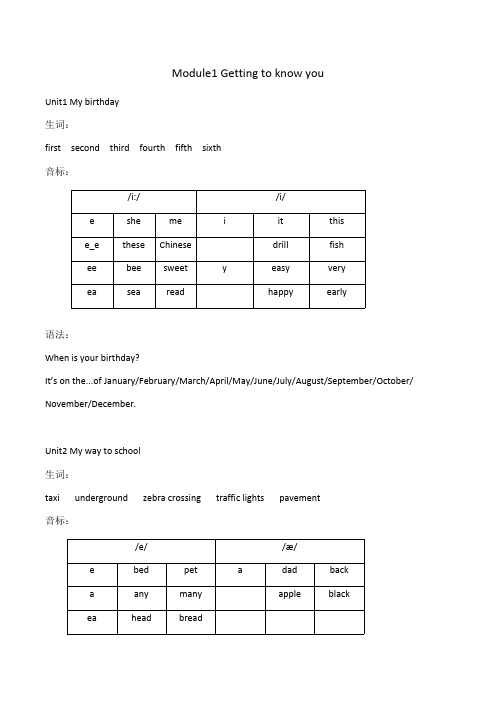
Module1 Getting to know youUnit1 My birthday生词:first second third fourth fifth sixth音标:/i://i/e she me i it thise_e these Chinese drill fishee bee sweet y easy veryea sea read happy early语法:When is your birthday?It’s on the...of January/February/March/April/May/June/July/August/September/October/ November/December.Unit2 My way to school生词:taxi underground zebra crossing traffic lights pavement音标:/e//æ/e bed pet a dad backa any many apple blackea head bread语法:How do you come to school? I come to school...Unit3 My future 生词:worker pilot farmer cook shop assistant音标:语法:What do you want to be?I want to be a/an...Module2 Me,my family and friendsUnit1 Grandparents 生词:write an e-mail go shopping play chess/p/p pick map /b/bbookjob/t/t taste fruit /d/ddatebadk kite work c cook picnic/k/ckclock duck /g/ggamebig音标:语法:How often...Unit2 Friends 生词:Same different both all音标:语法:sb. both...(do)...Unit3 Moving home/a://Λ/aclass past uus club askbath duck puzzle ararm park o other son sharplargelovecolour/u://ʊ/uruleusugar full putpull ootoo school oobook look roomtoothcookfoot生词:West north east south 音标:语法:Why...Because...Module3 Places and activitiesUnit1 Around the city 生词:Hotel bank hospital bakery museum cinema 音标:语法:/f/f food roof /v/v van live /θ/th think tooth /ð/ththatwith/s/s sigh bus ccity nice /z/z zoo size svisitis/ts/tslights parts boats rabbits /dz/dscards clouds handsbedsHow do I get to...,please?Walk along...Unit2 Buying new clothes 生词:button zip pocket 音标:语法:Which ... Do you like, the ... One or the ... One?I like the ... One.Unit3 Seeing the doctor 生词:fever toothache cough cold/ɔ://ɒ/or short horse ooffice box al hall fall off wrong au autumn naughty a what wantoordoorfloorwatch/ɜ://ə/er her term erteacher paper ir bird third driver farmer urnurseturna pandabananaor work word again along 音标:语法:What should I do?You should...Module4 The nature wordUnit1 Water生词:first next then finally音标:/tʃ//ʃ/ch cheap rich sh share fishChina each shirt brush/dʒ//ʒ/g age giraffe s usually pleasureorange cage televisionj job juicejam jump语法:First/Next/Then/Finally,...Unit2 wind 生词:gently stronger slowly quickly 音标:语法:It is blowing gently.Unit3 Fire 生词:Don’t smoke Don’t start campfires Don’t play near fires Don’t play with matches 音标:/tr//dr/trtree try drdress dry train trunk drink draw triangletrafficdrivedream/i:/sheep /i/ship /e/bed /æ/bad /p/pig /b/big /t/hat /d/had /k/back /g/bag /ɑ:/father /ʌ/brother /u:/food /ʊ/foot /f/leaf /v/leave /θ/both/ð/with/s/piece/z/please语法:We must/mustn’t.../ɔ:/water /ɒ/what /ɜ:/purple /ə/paper /t ʃ/rich/d ʒ/giraffe/ʃ/sure/ʒ/pleasure。

致易教育个性化指导教课方案五年级上册课本知识点梳理Module1 Unit1一,核心词汇1.first 第一2.second第二3.third 第三4.fourth 第四5.fifith 第五6.sixth 第六7.party 派对,聚会8.begain 开始9.bring 带来 10.wear 穿着 11.favourite 最喜欢的二,词组1.at Peter’ s birthday在partyPeter的寿辰聚会上2.on the 19th of September在 9 月 19 日3. on Sunday在周日4.at two o’clock在两点5. in the afternoon在下午6. at night 在夜晚7. sb. be tired某人很累8. my favourite color 我最喜欢的颜色9. That sounds interesting那.听上去幽默10. I can’t wait!我等不及了!11. Happy Birthday! 寿辰快乐12.Welcome to my party. 欢迎来我的派对13.a pair of orange trousers一条橙色的裤子14.make a birthday invitation 制作一张寿辰请帖15. make a hat制作一顶帽子16. have some fun过得快乐17.birthday present寿辰礼物三,词汇讲解1.bring,take,carry 辨析bring 是指把人或物从别处带到说话人所在的地方。
比方:Bring me some water, please请.给我取点水来。
carry 及物动词,“搬运,运送”,一般是指搬运较重的物品。
比方:carry a box on one’ s shoulder扛着箱子carry a baby on one’背s着back孩子“携带,带”比方:Almost every teacher carries a watch差.不多每位教师都带着一只表。


上海牛津英语五年级上册语法点整理1. 名词- 名词是用来表示人、事物、地方或抽象概念的词语。
- 名词有可数名词和不可数名词之分。
- 可数名词可以用来表示一个或多个,可以用a/an修饰。
- 不可数名词表示一种物质、一种抽象概念等,不能用a/an修饰,也没有复数形式。
2. 代词- 代词是用来代替名词的词语。
- 代词分为人称代词、物主代词、反身代词、指示代词、疑问代词、不定代词等种类。
- 代词可以用来替代特定的人或事物,使句子更加简洁清晰。
3. 形容词- 形容词用来修饰名词或代词,表示人或事物的性质、状态、特点等。
- 形容词通常放在名词或代词的前面。
- 形容词有原级、比较级和最高级之分,用来表示程度或比较。
4. 动词- 动词用来表示一个人或事物的动作、状态、存在等。
- 动词分为及物动词和不及物动词。
- 及物动词需要接宾语,不及物动词不需要接宾语。
- 动词的时态有过去时、现在时和将来时等。
5. 副词- 副词用来修饰动词、形容词、副词或整个句子,表示时间、地点、程度等。
- 副词通常放在要修饰的词语之前或之后。
6. 介词- 介词用来表示人或事物之间的关系。
- 介词通常与名词或代词连用,构成介词短语。
- 常见的介词有in、on、at、under等。
7. 冠词- 冠词用来表示名词的特指与泛指。
- 英语中的冠词分为定冠词和不定冠词。
- 定冠词the表示特指,不定冠词a/an表示泛指。
8. 句子- 句子是由主语和谓语构成的完整表达意思的语言单位。
- 句子分为陈述句、疑问句、祈使句和感叹句等种类。
- 句子根据结构可以分为简单句、并列句和复合句。
9. 从句- 从句是句子中的一部分,不能独立成句。
- 从句通常由连词引导,与主句之间存在一定的关系。
- 常见的从句有名词性从句、定语从句和状语从句等。
10. 时态- 时态用来表示动作发生的时间。
- 常见的时态有一般现在时、一般过去时、一般将来时等。
- 时态的使用与句子的主语和谓语的时态有关。

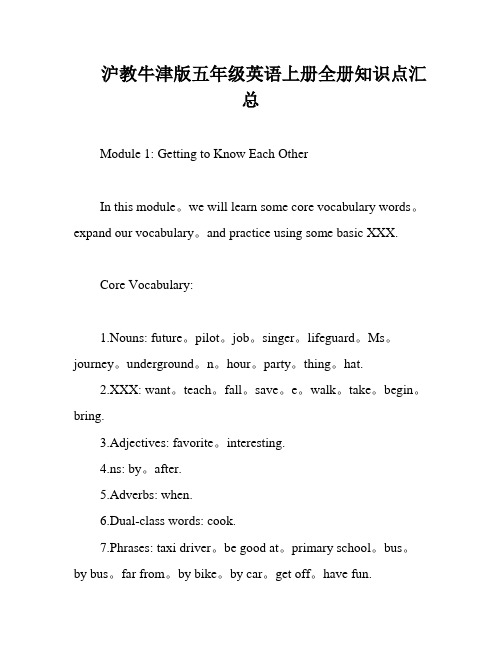
沪教牛津版五年级英语上册全册知识点汇总Module 1: Getting to Know Each OtherIn this module。
we will learn some core vocabulary words。
expand our vocabulary。
and practice using some basic XXX.Core Vocabulary:1.Nouns: future。
pilot。
job。
singer。
lifeguard。
Ms。
journey。
underground。
n。
hour。
party。
thing。
hat.2.XXX: want。
teach。
fall。
save。
e。
walk。
take。
begin。
bring.3.Adjectives: favorite。
interesting.4.ns: by。
after.5.Adverbs: when.6.Dual-class words: cook.7.Phrases: taxi driver。
be good at。
primary school。
bus。
by bus。
far from。
by bike。
by car。
get off。
have fun.XXX Vocabulary:1.Nouns: doctor。
XXX。
sky。
subject.2.Months: January。
February。
March。
April。
May。
June。
July。
August。
September。
October。
XXX。
XXX.3.XXX: help.4.Phrases: fly a plane。
be afraid of.XXX Structures:1."What do you want to be?" - "I want to be a pilot." (Asking XXX.)2."What do you want to be?" - "I want to be a XXX." (Asking XXX.)In this module。
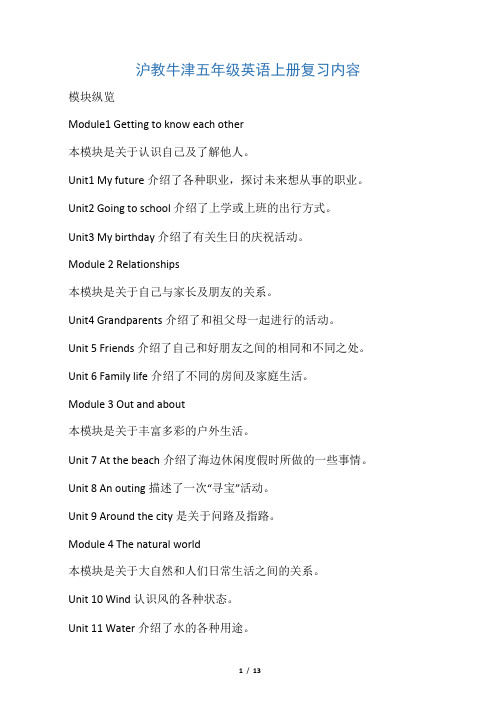
沪教牛津五年级英语上册复习内容模块纵览Module1 Getting to know each other本模块是关于认识自己及了解他人。
Unit1 My future介绍了各种职业,探讨未来想从事的职业。
Unit2 Going to school介绍了上学或上班的出行方式。
Unit3 My birthday介绍了有关生日的庆祝活动。
Module 2 Relationships本模块是关于自己与家长及朋友的关系。
Unit4 Grandparents介绍了和祖父母一起进行的活动。
Unit 5 Friends介绍了自己和好朋友之间的相同和不同之处。
Unit 6 Family life介绍了不同的房间及家庭生活。
Module 3 Out and about本模块是关于丰富多彩的户外生活。
Unit 7 At the beach介绍了海边休闲度假时所做的一些事情。
Unit 8 An outing描述了一次“寻宝”活动。
Unit 9 Around the city是关于问路及指路。
Module 4 The natural world本模块是关于大自然和人们日常生活之间的关系。
Unit 10 Wind认识风的各种状态。
Unit 11 Water介绍了水的各种用途。
Unit 12 Fire介绍了一些基本的防火知识。
第一单元复习1.词组Jump into the lakefly a planecook nice food(be) afraid of flyinghelp peopledrive a taxi(be)good at...2.句型用What do you want to be ?询问对方将来想从事的职业。
用I want to be ...及I want to(do)...介绍自己未来想从事的职业及理由。
3.难点1)当句子主语为第三人称单数时,动词要做适当的变化。
2)want to do与want to be的正确用法。

Module 2Relationships一、核心词汇1.名词:class 班;班级word 单词life 生活bedroom 卧室kitchen 厨房bathroom 浴室;卫生间light 灯;光TV 电视;电视机bedtime 就寝时间2.动词:visit 看望;拜访;参观cross 穿越;越过carry 背;提;拿say说ask 问answer 回答watch 观看;观察3.形容词:clever 聪明的same 相同的heavy 重的;沉的different 不同的bored 无聊的easy 容易的their他们的;她们的;它们的4.副词:then 然后;那么soon 很快;不久5.频率副词:usually 通常often 经常sometimes 有时always 总是;一直never 从不6.代词:both (两个)都7.介词:before 在……以前8.短语:play sport 做运动go shopping 去购物each other 互相make phone calls 打电话living room 客厅model plane 飞机模型do … homework 做家庭作业turn off 关掉watch TV 看电视tell a story 讲故事二、拓展词汇1.介词:with 与……2.短语:live in 居住play table tennis 打乒乓球三、核心句型1.—What do you usually do with your grandparents? 你通常和你的祖父母做什么?—I usually play chess with my grandpa. 我通常和我的祖父下棋.解读: 这是询问对方通常和某人做什么的句型及其回答.举一反三: —What do you usually do with your mother? 你经常和你的妈妈做什么?—We usually cool meals for my family. 我们经常为家人做饭.2.We both like sport. 我们都喜欢运动.解读: 这是描述两人都喜欢做某事的句型.举一反三: We both go to school on foot. 我们都步行去上学.3.I’m doing my homework. 我正在做家庭作业.解读: 这是描述某人正在做某事的句型.举一反三: He is swimming in the river. 他正在河里游泳.四、了解句型1.I often write emails to them. 我经常给他们写电子邮件.解读: 这是描述某人写电子邮件的频率的句型.举一反三: I often write emails to Lily at weekends. 我经常周末给莉莉写电子邮件.2.My grandparents live far from my home. 我的祖父母住得离我家很远.解读: 这是描述某人的居住地离某地远的句型.举一反三: My grandmother lives not far from my home. 我奶奶住得离我家不远.3.This is Mary. 我是玛丽.解读: 这是在打电话的情境中,介绍自己的句型.举一反三: This is Jim. 我是吉姆.e with me! 跟我来!解读: 这是描述跟随某人或某物的句型.举一反三: Come with us!跟着我们!5.She takes Mary and John to Grandma’s home. 她带着玛丽与约翰去了祖母家.解读: 这是描述带着某人去某地的句型.举一反三: My parents often take me to the zoo. 我的父母经常带我去动物园.6.We’re in the same class. 我们在相同的班级.解读: 这是描述两个事物的相同之处的句型.举一反三: We are in the same room. 我们在同一个房间.7.I like playing table tennis and Alice likes playing volleyball. 我喜欢打乒乓球,爱丽丝喜欢打排球.解读: 这是描述某人喜好的句型.举一反三: I like eating hamburgers. 我喜欢吃汉堡包.8.Oliver feels bored. 奥利佛感到很无聊.解读: 这是描述某人感受的句型.举一反三: He feels bored. 他感到很无聊.9.—Kitty, where are you? 凯蒂,你在哪里?—I’m in the living room. 我在客厅.解读: 这是询问某人在哪里的句型及其回答.举一反三: —Where’s he?他在哪里?—He’s in the bathroom. 他在浴室.10. …,but now I’m playing word games with my family. ……,但是现在我正在和我的家人玩文字游戏.解读: 这是描述正在和某人做某事的句型.举一反三: Look, Jim is playing football with his friends. 看,吉姆正在和他的朋友们踢足球.。

牛津版五年级英语上册Module 1 Getting to know each other一、核心词汇1.名词:future 将来;未来pilot 飞行员job 工作;职业singer 歌手lifeguard 救生员Ms 女士journey 旅程;旅行underground 地铁station 车站hour 小时party 聚会thing东西;事物hat 帽子2.动词:want 想要teach 教(课) fall 掉落;落下save 救;救助;节约become 变成;变得walk 走;步行take 乘坐(交通工具);带领begin 开始bring 带来3.形容词:favorite 最喜欢的interesting 有趣的4.介词:by(表示方式);靠近after 在……后5.副词:when 什么时候6.兼类词:cook 厨师;烹饪7.短语:taxi driver 出租车司机(be) good at 擅长primary school 小学bus stop 公共汽车站by bus 乘公共汽车far from 离……远on foot 步行by bike 骑自行车by car 乘小汽车get off 下车have fun 尽情玩二、拓展词汇1.名词:doctor 医生teacher 老师sky 天空subject 科目2.月份名词:January (Jan.) 一月February(Feb.) 二月March(Mar.) 三月April(Apr.) 四月May 五月June(Jun.) 六月July(Jul.) 七月August(Aug.) 八月September(Sept.) 九月October(Oct.) 十月November(Nov.) 十一月December(Dec.) 十二月3.动词:help 帮助4.短语:fly a plane 驾驶飞机be afraid of 害怕三、核心句型1.—What do you want to be? 你想要成为什么?—I want to be a pilot. 我想要成为一名飞行员。


Module 3Out and about一、核心词汇1.名词:beach海滩sunshine阳光shell贝壳sea海letter信year年岁;年outing远足map地图hill小山diamond钻石lake湖hole洞key钥匙left 左边hospital医院road路;马路2.动词:enjoy享受……的乐趣collect收集put放;安置know知道find发现;找到think想turn转向;转弯3.形容词:funny滑稽的;好笑的4.副词:quite相当;十分along沿着;顺着straight笔直地5.介词:between在……中间6.限定词:another另一个6.兼类词:right(名词)右边;(形容词)正确的7.短语:on holiday度假have a good time玩得高兴at the top of在……顶部get through通过post office邮局flower shop花店toy shop玩具店get to到达二、拓展词汇1.动词:swim游泳wear穿2.形容词:fun有趣的3.短语:look down向下看jump into跳进三、核心句型1.—Is Paul collecting shells? 保罗正在收集贝壳吗?—Yes, he is.是的,他正在收集贝壳.解读: 这是询问某人是否正在做某事的句型及其回答.举一反三: —Is your brother singing now? 你的哥哥正在唱歌吗?—Yes, he is. 是的,他正在唱歌.2.I’m 11 years old. 我11岁.解读: 这是描述某人年龄的句型.举一反三: Jim is 3 years old. 吉姆3岁.3.—What are you doing? 你正在做什么?—I’m reading the map. 我正在看地图.解读: 这是询问对方正在做什么的句型及其回答,是现在进行时的特殊疑问句.举一反三: —What is he doing now? 他正在做什么?—He is reading a book. 他正在看书.四、了解句型1.The Browns are on holiday in Sanya. 布朗一家正在三亚度假.解读: 这是描述某人在某地度假的句型.举一反三: The Greens are on holiday in Hawaii. 格林一家正在夏威夷度假.2.Let’s go swimming too, Peter. 我们也去游泳吧,彼得.解读: 这是以let开头的祈使句,用来对对方提出建议.举一反三: Let’s go shopping! 我们去购物吧!3.I want to put it in a bottle. 我想要把它放进一个瓶子里.解读: 这是描述某人想要做某事的句型.举一反三: I want to put the old books in the box. 我想把这些旧书放进盒子里.4.—Is it going to Australia? 它会去澳大利亚吗?—I don’t know. 我不知道.解读: 这是询问即将发生什么的句型及其回答.举一反三: —Are you going to Beijing? 你会去北京吗?—Yes, I am. 是的,我会去.5.Here’s the Big Stone. 大石头在这里.解读: 这是一个由here引导的倒装句.举一反三: Here is a beautiful dress. 这里有一条美丽的裙子.6.It says, “Look down and you can see the diamond.”信上写着:“向下看,你们能看见这颗钻石.”解读: 这是描述某人能够做某事的句型.举一反三: I can see the photo. 我能看见这张照片.7.The lake is like a big diamond! 这个湖像一颗大钻石!解读: 这是描述两个物品很相似的句型.举一反三: The shoe is like a boat. 这只鞋像一条船.8.How funny! 多么可爱(的兔子)呀!解读: 这是由how引导的感叹句,用来表示惊讶等情绪.举一反三: How beautiful the girl is. 多漂亮的女孩呀.9.She cannot get through the door. 她没办法通过这扇门.解读: 这是描述某人不能做某事的句型.举一反三: I can’t speak English. 我不会说英语.10.“What can I do?” she thinks. 她想:“我能做什么呢?”解读: 这是询问某人能做什么的句型.举一反三: —What can she do?她能做什么呢?—She can play chess.她会下棋.。

Module 3 Places and activitiesUnit 1 Around the cityI. Words 单词1. along / ə'lɔŋ/(1)作介词,意为“沿着;顺着”。
[例句]I was driving my car along a road. 我沿着马路开车。
(2)作副词,意为“向前,一起;带着(+ with),来到;去到”。
[例句]Come along with us. 跟我们一起去吧。
I'll be along in a minute. 我一会儿就来。
2. turn / tə:n/(1)作及物动词,意为“旋动.拧动;使转向;拐过,绕过”。
[例句]He turns the key in the lock.He turns his face to the wall. 他转过脸面向墙壁。
He turns the street corner. 他拐过街角。
(2)作不及物动词,意为“翻动,翻转(+ to);求助(+to);变化,改变( + into)”。
[例句]Let’s turn to page 8.I always turn to him for help. 我总是找他帮忙。
Water has turned into ice. 水已经结成了冰。
(3)作名词,意为“转弯”。
[例句]The car makes a left turn. 汽车向左转弯。
3. bank /bæŋk/(1)作名词,意为“银行”。
[例句]I keep my money in a bank. 我的钱存在一家银行里。
(2)作名词,意为“岸”。
[例句]They stood on the river bank to fish. 他们站在河岸边钓鱼。
4. cinema /'sɪnəmə/ n.电影院[例句]I often go to the cinema. 我经常去看电影。
Let's meet at the cinema. 让我们在电影院见面。

五年级上册英语知识点汇总:时间的读法:1.直接读法:小时分钟2.整点读法:小时o’clock3.半点读法:half past小时4.半点以内读法:分钟past小时·5.超过半点读法:差几分to下个小时6.含一刻钟读法:a quarter past小时(几点15分)a quarter to下个小时(几点45分)在几点(几分)用介词at相关词汇:基数词o’clock half quarter past to日期的表示:1.月份:January February March April May June July August SeptemberOctober November December对应的缩写:Jan.Feb.Mar.Apr.May.Jun.Jul.Aug.Sep.Oct.Nov.Dec.在几月用介词in,在几月几日,某天(的早中晚)用介词on2.日期:序数词:1~10:first second third fourth fifth sixth seventheighth ninth tenth11~20:eleventh twelfth thirteenth fourteenthfifteenth sixteenth seventeenth eighteenthnineteenth twentieth整十的序数词:变y为ie+th几十几的序数词:几十用基数词-个位用序数词例:21→twenty-first对应的缩写:1st2nd3rd其余的直接数字+th3.几月几日的表示:the日期of月份例:12月28日→the twenty-eighth of December月份日期例:12月28日→December twenty-eighth4.疑问代词When和What time的区别:When What time 询问做某事的时间√√(具体时间)询问年份,月份,日期√√询问现在几点(钟表时间)××乘坐交通工具的两种表达方式:take:take用作动词,表示乘、坐某一交通工具,且在表示该交通工具的名词前一般应有冠词等修饰词。

牛津英语上海版五年级上册知识点It was last revised on January 2, 2021M o d u l e 1 G e t t i n g t o k n o w y o uUnit1 My birthday 生词:first second third fourth fifth sixth 音标:语法: When is your birthday It ’s on the...of January/Februa ry/March/April/May/June/July/August/September/October/ November/December. Unit2 My way to school 生词:taxi underground zebra crossing traffic lights pavement 音标:语法:How do you come to school I come toschool...Unit3 My future 生词:worker pilot farmer cook shop assistant语法:What do you want to be? I want to be a/an...Module2 Me,my family and friendsUnit1 Grandparents 生词:write an e-mail go shopping play chess音标:语法: How often... Unit2 Friends生词:Same different both all 音标:语法:sb.both...(do)... Unit3 Moving home生词:West north east south 音标:语法: Why... Because...Module3Places and activitiesUnit1 Around the city 生词:Hotel bank hospital bakery museum cinema 音标:语法:How do I get to...,please? Walk along...Unit2 Buying new clothes 生词:button zip pocket 音标:语法:Which ... Do you like, the ... One or the ... One? I like the ... One.Unit3 Seeing the doctor 生词:fever toothache cough cold音标: 语法:What should I do? You should...Module4 The nature wordUnit1 Water 生词:first next then finally 音标:语法:It is blowing gently. Unit3 Fire 生词:Don ’t smoke Don ’tstart campfires Don ’t play near fires Don ’t play with matches 音标: 语法: We must /mustn ’t...。
沪教牛津五年级英语上册复习内容模块纵览Module1 Getting to know each other本模块是关于认识自己及了解他人。
Unit1 My future 介绍了各种职业,探讨未来想从事的职业。
Unit2 Going to school 介绍了上学或上班的出行方式。
Unit3 My birthday 介绍了有关生日的庆祝活动。
Module 2 Relationships本模块是关于自己与家长及朋友的关系。
Unit4 Grandparents 介绍了和祖父母一起进行的活动。
Unit 5 Friends 介绍了自己和好朋友之间的相同和不同之处。
Unit 6 Family life 介绍了不同的房间及家庭生活。
Module 3 Out and about本模块是关于丰富多彩的户外生活。
Unit 7 At the beach 介绍了海边休闲度假时所做的一些事情。
Unit 8 An outing 描述了一次“寻宝”活动。
Unit 9 Around the city 是关于问路及指路。
Module 4 The natural world本模块是关于大自然和人们日常生活之间的关系。
Unit 10 Wind 认识风的各种状态。
Unit 11 Water 介绍了水的各种用途。
Unit 12 Fire 介绍了一些基本的防火知识。
第一单元复习1.词组Jump into the lake fly a plane cook nice food(be) afraid of flying help people drive a taxi(be)good at...2.句型用What do you want to be ?询问对方将来想从事的职业。
用I want to be ...及I want to (do)...介绍自己未来想从事的职业及理由。
3.难点1)当句子主语为第三人称单数时,动词要做适当的变化。
2)want to do 与want to be 的正确用法。
3)许多动词词尾加er可构成名词。
如:teach--teachersing--singer play---player。
但,也有例外,如cook可做动词,意为“烹饪”,也可做名词,意为“厨师”,而cooker的意思则为“炉灶;炉具”。
习题:1.用所给词的适当形式填空1)Jim _____ (want) to be a doctor. He can _____ (help) people.2)Ms Fang _____ (be) a teacher. She _____ (teach) us Science.3)What ____ (do )your brother want to be ?4)May ____ (like) cooking. She wants to _____ (be) a cook .5)I’m good at ______ (sing).I want to be a ______(sing).6)My father is a taxi_____ (drive). He likes _____ (drive).第二单元复习1.词组come to school take the train get off(the train) on foot/walk after half an hour take the school bus /by school bus bus stop2.句型11)用How do you come to school?询问对方上学的交通方式。
2)用I come /go to school...He She comes /goes to school...介绍自己或他人去某地的交通方式。
3难点1)表示不同交通方式的短语on foot , by bus等所用的介词不同。
2)区分go to school 和come to school 的用法。
习题:用所给词适当形式填空1)Ms Guo _____(live) on Green Street.2)Mr Black _____(take) Bus No.18 to Yellow Street.3)I ____(come)to school by bus.4)My father _____(go) to work by car.第三单元复习1.词组right away have fun favourite colour2.句型1)用When’s your birthday?询问对方的生日。
2)用It's on...来回答有关日期的问题。
3)用Can you ...?来邀请或请求对方做某事。
3.难点1)日期的表达法在书面和口语中的差异。
如:在五月一日这一词组,书面可表达为:on 1st May ,口语则表达为:on the first of May2)序数词的构成和含义习题:写出相应的英文1)第三__________ 2)第五_________ 3)第九________4)第三十__________ 5)在11月12日______________第四单元复习内容1.词组play sport go shopping play chess play footballthe Double Ninth Festival2.句型1)用What do you usually do with your grandparents?询问对方与祖父母一起做的事。
2)用句型I always /usually /often/sometimes ...with my grandparents.描述自己和祖父母一起做的事。
3)This Mary.4)Come with me.3.难点频率副词的含义区别。
习题:写出相应的英文1)做运动___________ 2)离我家远_______________3)在周末___________ 4)一周两次______________5)在公交车站_______________第五单元复习内容1.词组each other make phone calls not...at all like helping peoplecarry heavy bags in the same class2.句型We both like...I’m bored.I don’t know.Is that Ken?3.难点same前面要加theboth与all的用法区别习题:选词填空完成句子。
easy both all heavy different the same1)I am Tony. Jimmy is my friend. We ____work at the hospital.2)Sandy has two good friends. They are at ________school. They_______like playing football.3)I am Lily. I have a friend. Her name is Daisy. We ____like singing. We are in ________classes. I am in Class A, and she is in Class C.4)I have three toy bears. They have _____colours. I like _______of them.5)—What’s in your bag? It’s so ____.—There are some fruit and drinks.6)The exercises are ________.Teddy finished them quickly.第六单元复习内容1.词组watch TV turn off do one’s homework tell a storyfall down look at the stars2.句型用现在进行时描述自己及他人正在做的事情。
I’m doing my homework.3.难点1)现在进行时的结构及用法。
现在进行时的构成是:主语+be +v.ing〔现在分词〕形式现在进行时表示动作发生的时间是“现在”,动作目前的状态是“正在进行中”。
所谓“正在进行中”,是指在谈到这件事的时候,这个动作还在进行中.至于它是什么时候开始的,什么时候会停下来,不是我们关心的。
2)一般现在时与现在进行时的区别。
一般现在时表示主语经常性和习惯性的动作或存在的状态,也表示说话者的能力及自然现象。
习题:翻译下列句子1)我正在和家人玩单词游戏。
2)我爸爸正在做晚饭。
3)我通常睡前读一本有趣的故事书。
第七单元复习内容1.词组on holiday enjoy the sunshine collect shellsread a book go swimming throw the bottle into the seawrite a letter2.句型1)用现在进行时的一般疑问句Is /Are...(doing)询问他人正在做的事情,并做出肯定或者否定回答。
2)用现在进行时描述人们在海边度假时所做的一些事情。
3.难点现在进行时的一般疑问句形式。
习题:选择填空1)—____she reading a book ?—Yes,she is .A .Am B. Are C. Is2)—_____we going home?—No,we aren’t. We are going to the park.A. AreB. IsC. Do3)—Is Sally _______a model ship?—No, she isn’t.A .make B. makes C. making4)—What do you like?—I like ______stamps and postcards.A. listeningB. lookingC. collecting5)—Would you like to go ______with us?—Sure.A. swimmingB. swimC. Swims第八单元复习内容1.词汇at the top of... get through look down be likerun away run after... jump into2.句型用现在进行时的特殊疑问句What are you doing?询问他人正在做的事,并能做出回答。
3.难点理解现在进行时的表意功能。
习题:写出相应的英文1)穿着外套2)在山顶上3)往下看4)看地图5)这里有一封信。